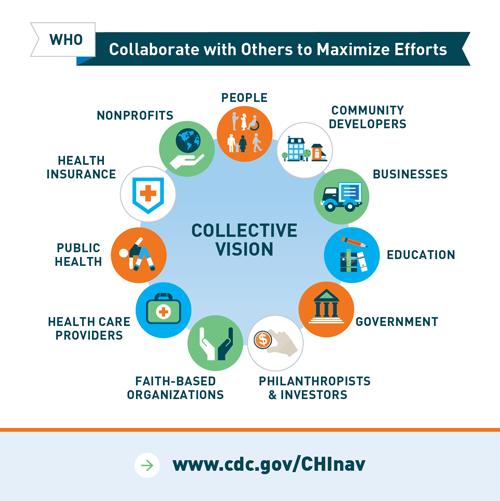6
Community Resources

Like many aspects of life, fall prevention takes a village. Falls are serious events, and they can be a lifelong problem for older adults. There is no one individual or group who can manage the issue alone; many different people and parts all need to work together in fall prevention.
Here are some people you can find to build a strong support network:
Someone to listen to you: It’s important to be able to share your thoughts and feelings with others. It’s also important to have someone who can be open and honest with you. Find one or two people with whom you can share both positive and negative aspects of your life. Find someone who is willing to listen rather than always trying to give you advice. Who will listen to you and avoid being judgmental when you’re struggling or get off track?
Someone to participate with you: It’s often easier and more enjoyable to make lifestyle changes when others participate with you. Will it help if a family member or friend makes some changes with you? Try to find others with similar interests and needs as you (e.g., an exercise or lunch partner who is committed to making healthy changes).
Someone to encourage you: It’s easier to make changes when others are encouraging and supporting you. Having someone to encourage you can be helpful when you slip up or don’t reach your goals as quickly as you would like. Who can provide the encouragement you need when you get discouraged? It’s important to feel that others are proud of your successes. Who will be excited about your success?
Someone to provide knowledge: To achieve your goals, you may need to build some relationships with people who have knowledge and experience in the areas in which you’re trying to make changes. Who can help provide the knowledge and skills you need for success? Talking with someone who has already been successful with weight management or lifestyle change can often be helpful.
Someone to assist you: Successful change may require you to reorganize the ways you spend your time. You may also find that you need others to help you get things done. What help do you need to free up time to exercise, or cook a health meal? Who can help you around the house or at work so you can make time for things you need to do to achieve your physical activity goals?
The next element to consider is the importance of building partnerships. Here are some keys to successful partnerships:
COMMUNICATION is the key to building supportive relationships. Let your family and friends know your thoughts and feelings. Be clear with them about how and when they should provide support. They need to hear from you that you really want to achieve your goals, you’re committed to success, and you want them behind you.
CHOOSE good partners. And more than one! One person may not be able to provide all the support you need, so reach out to more than one person. You could choose someone who is making the same change s you are and support each other. Or maybe choose someone who is healthy and whom you look up to for their active lifestyle. Most important, choose someone who is a good listener, who can support you and encourage you when you’re down.
ASK for the specific help you need and develop a plan together. Never expect others to know how to provide the support you need. Not being specific about your needs is one of the most common roadblocks to obtaining helpful social support.
Let’s practice!
Use the following questions to help you build your support team. Start by thinking about what goals you need help achieving. next, determine the specific types of support you will need to achieve your goal. Think about specific family members, friends, community groups, or coworkers who can best provide the type of support you need. The final step is to make specific plans to ask for the support you need.
Creating a Plan for Social Support
In the space below, write down the name of the person or group you plan to lean on for social support this week. At the end of the week, reflect on how it went. For instance, was it a good or bad experience? Would you reach out to them again? Then take a few minutes to reflect on what you learned and continue to improve your support network.
1. What group or person would you like to reach out to for support this week?
Write your new social support here:
____________________________________________________________
2. What specific challenge do you need support to overcome?
__________________________________________________________________
__________________________________________________________________
3. How can this group or person support you and help you reach your goal for
the week? (Be specific. They will need to know exactly how they can help.)
__________________________________________________________________
__________________________________________________________________
4. Did you successfully meet your goals for the week?
Yes No
5. What did you think about trying a new form of social support (in terms of
positive experiences, negative, ease of access, etc.)?
__________________________________________________________________
__________________________________________________________________
__________________________________________________________________
6. Do you think that you would try to use this same social support network again or seek new social support if
you wanted to or needed to in the future?
Yes No
Appendix A has a great list of resources that can also help you along your journey
Thoughts and Feelings
Let’s talk about what you have been thinking. Positive thoughts encourage and assist a person to stay motivated. Negative self-talk becomes will stop forward progress. Read over the following hand outs for additional information on turning negative thoughts to positive thoughts.
Positive to Negative thoughts final
Media Attributions
- Collective vision
